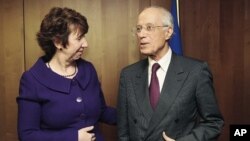European Union lawmakers are in Tunisia Thursday on a fact-finding mission as the country's interim government enacts sweeping reforms, including firing police chiefs and governors.
The visit to Tunisia by a European Union parliament delegation comes as the 27-member bloc has promised to help Tunisia, as it prepares for presidential elections six months from now.
EU foreign affairs chief Catherine Ashton met with Tunisia's Foreign Minister Ahmed Ounaies on Wednesday. She outlined EU's proposals to reporters during a joint news conference.
"We were able to discuss some of the concrete proposals - ways we can support you [Tunisia] in the short term, but also build that support for the long term. Electoral support, the transition in democracy, support to civil society and NGOs [non-governmental organizations], to fight corruption and develop economically and socially," Ashton said.
Tunisia's transitional government appears to be making good its promise to usher in a new political era. On Wednesday, it fired more than two dozen top police officers and, according to the country's official TAP news agency, all 24 of the country's governors.
Tunisia's judiciary is also investigating the vast assets belonging to ousted leader Ben Ali and his family, who are accused of financial abuses.
Foreign Minister Ahmed Ouanies says the probe is an affair for Tunisia's justice, which is independent and must work at its own pace. The European Union announced this week it was freezing overseas assets belonging to leader Zine El Abidine Ben Ali and his associates.
Mr. Ouanies says Tunisia is intent on returning to its essence, as an Arab, Islamic and Mediterranean country that is also one that is liberal - politically, economically and in terms of human rights. Observers note that he chose to make his first official trip overseas as foreign minister to Brussels.
EU Ministers Visit Tunisia




